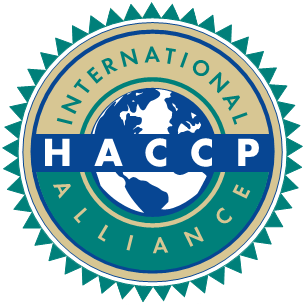Certified HACCP Principles and GAPs for Fresh Produce Industries Course
- Duration: 18 hours
- Cost: $299 USD
This course is recognized as an Introduction to HACCP course requirements under the Codex Alimentarius, ISO 22000, and GFSI scheme requirements such as SQF, BRC, FSSC 22 000, etc.
Our Certified HACCP Principles and GAPs for Fresh Produce Industries course is self-directed and designed to assist you in implementing a food safety plan successfully. Learn how to identify, reduce, and ultimately prevent potential sources of contamination in your fresh produce operation.
A certificate from eHACCP, accredited by the International HACCP Alliance, is issued once the course is successfully completed. This course is recognized as an Introduction to HACCP course requirements under the Codex Alimentarius, ISO 22000, and GFSI scheme requirements such as SQF, BRC, FSSC 22 000, etc.

Subjects
- What is HACCP? – History, relevance, definitions. Food Safety Modernization Act requirements for and impacts on producers and processors
- Understand the Extent of Foodborne Illnesses – Requirements for and impacts on producers and processors
- Hazards Covered Under HACCP – Food and waterborne hazards
- Illnesses from Contaminated Water and Food – The associated illnesses of these hazards
- Conditions for Pathogen Growth and Survival – Examining FAT TOM and associated CCPs
- Documents and Procedures Required Prior to HACCP Plan Implementation – Prerequisites like GMPs, SOPs, GAPs, SSOPs required to support the HACCP plan
- HACCP Prerequisites, GMPs, and GAPs for the fresh produce industries – Specific SOPs, SSOPs, GMPs, and GAPs
- Developing Your HACCP Plan – The team, the product, and the process.
- Applying the Seven Principles of HACCP – Hazard Analysis, Critical Control Points, Critical Limits, Monitoring, Corrective Actions, Verification, Record Keeping, Training, and Audits
Accredited by the International HACCP Alliance
Learning Outcomes
- Understand the purpose and function of a HACCP system
- Recognize regulatory requirements for HACCP under the new Food Safety Modernization Act
- Identify conditions that promote waterborne and foodborne pathogen growth, recognize the steps needed to prevent pathogens, and learn corrective actions to control and reduce them
- Learn how to meet government, industry, and auditor requirements for the development, implementation, and maintenance of a working HACCP plan
- Learn USDA’s HACCP training requirements under 21 CFR Parts 416 and 417
- Learn how to implement Good Manufacturing Practices to support the plan
- Learn how to develop a strong HACCP team
- Understand why record keeping and training are crucial to HACCP success.
Examinable
- Each of the 11 modules has a pool of questions related to the subject matter taught
- The module questions are optional and the results do not count towards the final grade
- There is a final exam consisting of 22 questions pulled randomly from the modules
- Each exam is unique
Features
- Accredited by the International HACCP Alliance
- Bookmarking
- Mobile / Responsive
- SCORM compliant
- 1-year access
- PRP templates and other documentation
- A certification attesting your completion of 18 hours of HACCP Training
